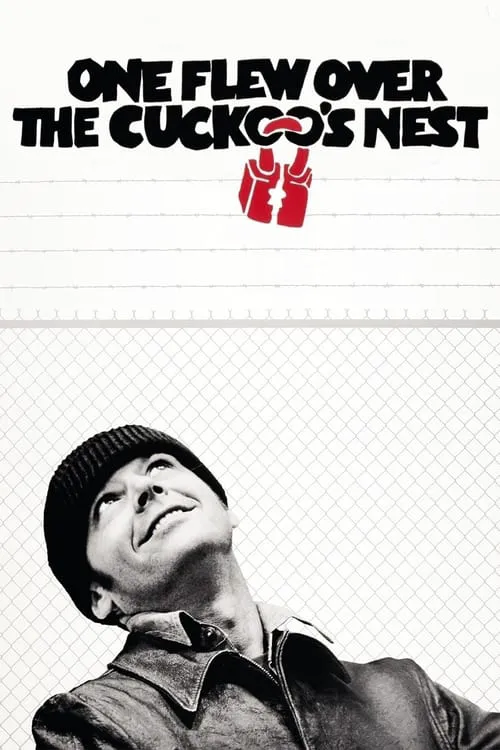One Flew Over the Cuckoo's Nest

Plot
In the 1975 film "One Flew Over the Cuckoo's Nest," director Miloš Forman brings to life a gripping drama based on the novel by Ken Kesey, exploring themes of individuality, rebellion, and the fragile boundaries between sanity and insanity. At the center of the story is Randle McMurphy, a charismatic and uncooperative petty criminal played by Jack Nicholson. McMurphy, determined to serve his sentence outside the harsh realities of prison, checks himself into a psychiatric ward, cleverly manipulating the system by feigning mental illness. His plan works, and he is admitted to the ward, a tranquil, seemingly idyllic institution where he joins a group of eccentric and vulnerable men living under the tyrannical control of Nurse Ratched. Led by the unyielding and severe Nurse Ratched, played by Louise Fletcher, the ward operates with a strict, dictatorial regime where emotions are suppressed, and free will is suffocated. Under her watchful eye, the patients are forced to conform to a rigid schedule, adhere to mind-numbing routines, and forsake any semblance of individuality. It's a regime where the patients are reduced to mere automatons, stripped of their dignity and autonomy. Randle McMurphy's arrival at the ward sets in motion a chain of events that challenges Nurse Ratched's authority and sets him on a collision course with the Nurse. Initially enchanted by McMurphy's carefree attitude and genuine concern for the well-being of his fellow patients, McMurphy soon finds himself as a symbol of resistance against Nurse Ratched's suffocating control. His unwavering opposition sparks a leadership role among the patients, who, tired of their pitiful existence, dare to dream of a life beyond the walls of the ward. As McMurphy molds the patients into a makeshift family, challenging Nurse Ratched's authority and pushing the boundaries of what is acceptable within the institution, their animosity towards her grows. Her fixation on McMurphy intensifies, viewed by the patients as a personal affront to her dominance over their lives. Ratched perceives McMurphy's actions as a direct challenge to her regime, a threat to her carefully constructed world, and a relentless undermining of her authority. The true nature of Nurse Ratched is exposed through her complex relationship with her patients. Beneath her hardened exterior lies a broken, damaged individual, who masked her personal pain with a strict, rational demeanor. Kesey paints a nuanced picture of Nurse Ratched as a symbol of modern society's oppressive forces, with McMurphy as the embodiment of the individual spirit yearning to break free from the regime of oppressive norms. The hospital's strict heirarchy of "therapists," patients and RNs is expertly explored by Kesey, and through his lead character, Randle McMurphy. McMurphy's eventual descent into madness—told with relentless relativity—only serves to demonstrate how desperately the authorities sought to assert control, even if by sheer manipulation and emotional manipulation. McMurphy becomes the focal point of a tumultuous power struggle between himself and Nurse Ratched. With McMurphy's unyielding spirit testing Nurse Ratched's resolve, tensions escalate, leading to a tragic confrontation that changes the lives of everyone in the ward. Ultimately, the rules of the game prove to be rigged, as Ratched unleashes a devastating blow that silences McMurphy's rebellious spirit for good, leaving the patients shattered and a changed Nurse Ratched forever haunted. The performances of Jack Nicholson as Randle McMurphy and Louise Fletcher as Nurse Ratched are testament to the powerful storytelling of Kesey's novel and Forman's sensitive direction. "One Flew Over the Cuckoo's Nest" stands as a landmark film that masterfully explores the human condition, striking a chord in audiences worldwide.
Reviews
Zoey
Better to die free than live as a cog in the machine, stripped of your will and individuality. That's the raw, defiant heart of "One Flew Over the Cuckoo's Nest."
River
I watched this film in college, and it was almost a turning point for me, from idealism to realism. "Reality is an asphalt road; leaving a footprint on it is harder than climbing to the sky."
Valerie
"At least I tried, though" ★★★★
Sadie
It's impossible to fly over; society itself is a giant mental institution.
Nevaeh
Whether now or in the future, asylums and Nurse Ratched, disguised in various forms, lurk around us. "One Flew Over the Cuckoo's Nest" will forever hold its significance.
Recommendations




